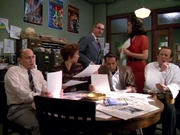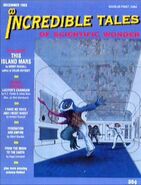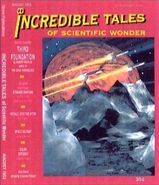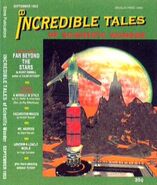(→Featured covers: added image) |
m (Robot: Automated text replacement (-{{[Nn]Cwiki-title +{{mbeta-title)) Tag: apiedit |
||
| (35 intermediate revisions by 19 users not shown) | |||
| Line 1: | Line 1: | ||
| − | [[ |
+ | [[File:Incredible Tales staff.jpg|thumb|The staff of the ''Incredible Tales'' magazine]] |
| − | '''''Incredible Tales''''', |
+ | '''''Incredible Tales of Scientific Wonder''''', or just '''''Incredible Tales''''' for short, was a [[science fiction]] [[magazine]] published in [[New York City]] in the [[United States of America]] in the [[1950s]] as experienced by [[Captain]] [[Benjamin Sisko]] under influence of [[vision]]s from the [[Prophet]]s and [[Pah-wraith]]s. Its owner was Mr. [[Stone (publisher)|Stone]], and its main office was in the [[Arthur Trill Building]] in [[Harlem]]. |
| − | In the visions experienced by Sisko, the people of his life on [[Deep Space 9]] were transposed to this setting, taking on the lives of people of the era. Sisko himself became [[Benny Russell]], a black writer struggling with the [[racism]] of the time; [[Kay Eaton]], aka "K.C. Hunter", also confronted prejudices of the time and was forced to hide her identity as a woman science fiction writer from the magazine's readers. [[Douglas Pabst]] was the magazine's editor and its other writers included [[Julius Eaton]], [[Albert Macklin]], [[Herbert Rossoff]] and [[Hugh Campbell]]. [[Darlene Kursky]] worked as a secretary |
+ | In the visions experienced by Sisko, the people of his life on [[Deep Space 9]] were transposed to this setting, taking on the lives of people of the era. Sisko himself became [[Benny Russell]], a black writer struggling with the [[racism]] of the time; [[Kay Eaton]], aka "K.C. Hunter", also confronted prejudices of the time and was forced to hide her identity as a woman science fiction writer from the magazine's readers. [[Douglas Pabst]] was the magazine's editor and its other writers included [[Julius Eaton]], [[Albert Macklin]], [[Herbert Rossoff]], and [[Hugh Campbell]]. [[Darlene Kursky]] worked there as a secretary. Russell's conflict with the magazine's position came to a head when, rather than publishing his [[Deep Space Nine (novella)|story about a black captain of a space station]], the owner of the magazine had the entire print run pulped before it went on sale. |
The typical working structure of the magazine had the house illustrator, [[Roy Ritterhouse]], creating several drawings on a [[month]]ly basis. These illustrations were then handed out to the writers on an assignment basis. The writers in turn were expected to develop stories that would accompany the images for which they typically were paid on a per-word basis. |
The typical working structure of the magazine had the house illustrator, [[Roy Ritterhouse]], creating several drawings on a [[month]]ly basis. These illustrations were then handed out to the writers on an assignment basis. The writers in turn were expected to develop stories that would accompany the images for which they typically were paid on a per-word basis. |
||
| Line 8: | Line 8: | ||
Other artists that provided illustrations for the magazine included [[John Eaves (artist)|John Eaves]] and [[Rick Sternbach (artist)|Rick Sternbach]]. |
Other artists that provided illustrations for the magazine included [[John Eaves (artist)|John Eaves]] and [[Rick Sternbach (artist)|Rick Sternbach]]. |
||
| − | The magazine's main competition of the time was '' |
+ | The magazine's main competition of the time was ''{{dis|Galaxy|magazine}}'', which featured the works of notable authors such as [[Ray Bradbury]], [[Isaac Asimov (author)|Isaac Asimov]], and [[Robert Heinlein]]. ({{DS9|Far Beyond the Stars}}) |
| + | {{bginfo|The various magazine covers paid homage to science fiction, including ''[[Star Trek]]'' itself, by using titles similar to those of well-known science fiction or ''Star Trek'' stories. In particular, the March 1953 issue pays homage to [[TOS]] by using names of episodes from that series, credited to their original writers, as well as featuring the matte painting used in {{e|Where No Man Has Gone Before}}.}} |
||
| ⚫ | |||
| + | |||
| ⚫ | |||
| + | ==Staff== |
||
| ⚫ | |||
| + | *[[Douglas Pabst]] - Editor |
||
| ⚫ | |||
| + | *[[Herbert Rossoff]] - Writer |
||
| ⚫ | |||
| + | *[[Benny Russell]] - Writer |
||
| ⚫ | |||
| + | *[[Julius Eaton]] - Writer |
||
| ⚫ | |||
| + | *[[Kay Eaton]] - Writer |
||
| ⚫ | |||
| + | *[[Albert Macklin]] - Writer |
||
| + | *[[Roy Ritterhouse]] - Illustrator |
||
| + | *[[Darlene Kursky]] - Secretary |
||
==Featured stories== |
==Featured stories== |
||
* "[[1001: First Odyssey]]" |
* "[[1001: First Odyssey]]" |
||
* "[[Assault on Planet 10]]" |
* "[[Assault on Planet 10]]" |
||
| − | * "[[ |
+ | * "[[Bad Day at Red Rock]]" |
| + | * "[[The Cage]]" |
||
| − | * "[[ |
+ | * "[[The Corbomite Maneuver]]" |
* "[[Dad's Revenge]]" |
* "[[Dad's Revenge]]" |
||
* "[[The Dogs Themselves]]" |
* "[[The Dogs Themselves]]" |
||
| − | * "[[ |
+ | * "[[Far Beyond the Stars]]" |
* "[[Federation and Empire (story)|Federation and Empire]]" |
* "[[Federation and Empire (story)|Federation and Empire]]" |
||
| + | * "[[First Contact (story)|First Contact]]" |
||
* "[[From the Moon to the Earth]]" |
* "[[From the Moon to the Earth]]" |
||
* "[[Hazardous Images]]" |
* "[[Hazardous Images]]" |
||
* "[[I Have No Voice So I Must Shout]]" |
* "[[I Have No Voice So I Must Shout]]" |
||
| − | * "[[ |
+ | * "[[Journey to Babel]]" |
| + | * "[[Legends of the Ferengi (story)|Legends of the Ferengi]]" |
||
* "[[Loner in a Lonely World]]" |
* "[[Loner in a Lonely World]]" |
||
* "[[Lucifer's Chainsaw]]" |
* "[[Lucifer's Chainsaw]]" |
||
| Line 40: | Line 46: | ||
* "[[Questor]]" |
* "[[Questor]]" |
||
* "[[Solar Odyssey]]" |
* "[[Solar Odyssey]]" |
||
| + | * "[[Space Mongoose]]'" |
||
* "[[Space Mutant]]" |
* "[[Space Mutant]]" |
||
* "[[Strange Martian]]" |
* "[[Strange Martian]]" |
||
* "[[Third Foundation]]" |
* "[[Third Foundation]]" |
||
* "[[This Island Mars]]" |
* "[[This Island Mars]]" |
||
| + | * "[[Trials and Tribble-ations]]'" |
||
* "[[Voyage into the Atom]]" |
* "[[Voyage into the Atom]]" |
||
* "[[Venusian Chronicles]]" |
* "[[Venusian Chronicles]]" |
||
| − | * "[[ |
+ | * "[[Where No Man Has Gone Before]]" |
* "[[A Wrinkle in Space]]" |
* "[[A Wrinkle in Space]]" |
||
| ⚫ | |||
| ⚫ | |||
| ⚫ | |||
| ⚫ | |||
| ⚫ | |||
| ⚫ | |||
| + | File:Incredible Tales Cover - March 1953.jpg|[[March (month)|March]], 1953 (complete, black and white) |
||
| + | File:Incredible Tales - April 53.jpg|[[April]], 1953 |
||
| ⚫ | |||
| ⚫ | |||
| ⚫ | |||
| + | |||
| + | ==External link== |
||
| + | *{{mbeta-title}} |
||
| + | |||
[[de:Incredible Tales]] |
[[de:Incredible Tales]] |
||
| + | [[fr:Incredible Tales of Scientific Wonder]] |
||
| ⚫ | |||
Revision as of 15:25, 4 July 2015

The staff of the Incredible Tales magazine
Incredible Tales of Scientific Wonder, or just Incredible Tales for short, was a science fiction magazine published in New York City in the United States of America in the 1950s as experienced by Captain Benjamin Sisko under influence of visions from the Prophets and Pah-wraiths. Its owner was Mr. Stone, and its main office was in the Arthur Trill Building in Harlem.
In the visions experienced by Sisko, the people of his life on Deep Space 9 were transposed to this setting, taking on the lives of people of the era. Sisko himself became Benny Russell, a black writer struggling with the racism of the time; Kay Eaton, aka "K.C. Hunter", also confronted prejudices of the time and was forced to hide her identity as a woman science fiction writer from the magazine's readers. Douglas Pabst was the magazine's editor and its other writers included Julius Eaton, Albert Macklin, Herbert Rossoff, and Hugh Campbell. Darlene Kursky worked there as a secretary. Russell's conflict with the magazine's position came to a head when, rather than publishing his story about a black captain of a space station, the owner of the magazine had the entire print run pulped before it went on sale.
The typical working structure of the magazine had the house illustrator, Roy Ritterhouse, creating several drawings on a monthly basis. These illustrations were then handed out to the writers on an assignment basis. The writers in turn were expected to develop stories that would accompany the images for which they typically were paid on a per-word basis.
Other artists that provided illustrations for the magazine included John Eaves and Rick Sternbach.
The magazine's main competition of the time was Galaxy, which featured the works of notable authors such as Ray Bradbury, Isaac Asimov, and Robert Heinlein. (DS9: "Far Beyond the Stars")
Staff
- Douglas Pabst - Editor
- Herbert Rossoff - Writer
- Benny Russell - Writer
- Julius Eaton - Writer
- Kay Eaton - Writer
- Albert Macklin - Writer
- Roy Ritterhouse - Illustrator
- Darlene Kursky - Secretary
Featured stories
- "1001: First Odyssey"
- "Assault on Planet 10"
- "Bad Day at Red Rock"
- "The Cage"
- "The Corbomite Maneuver"
- "Dad's Revenge"
- "The Dogs Themselves"
- "Far Beyond the Stars"
- "Federation and Empire"
- "First Contact"
- "From the Moon to the Earth"
- "Hazardous Images"
- "I Have No Voice So I Must Shout"
- "Journey to Babel"
- "Legends of the Ferengi"
- "Loner in a Lonely World"
- "Lucifer's Chainsaw"
- "Me, Android"
- "Metamorphosis"
- "A Most Fortunate Accident"
- "Quantity of the Monster"
- "Questor"
- "Solar Odyssey"
- "Space Mongoose'"
- "Space Mutant"
- "Strange Martian"
- "Third Foundation"
- "This Island Mars"
- "Trials and Tribble-ations'"
- "Voyage into the Atom"
- "Venusian Chronicles"
- "Where No Man Has Gone Before"
- "A Wrinkle in Space"
Featured covers
External link
- Incredible Tales of Scientific Wonder at Memory Beta, the wiki for licensed Star Trek works







